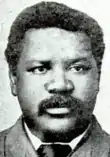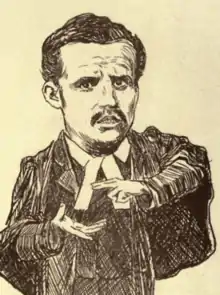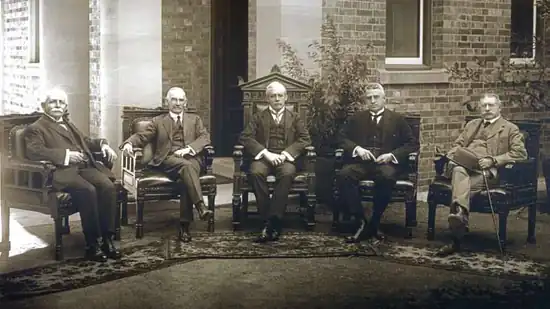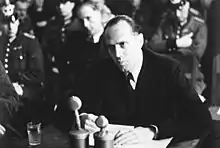James Rose Innes
Sir James Rose Innes KCMG PC KC (8 January 1855 – 16 January 1942) was the Chief Justice of South Africa from 1914 to 1927 and, in the view of many, its greatest ever judge.[1][2] Before becoming a judge he was a member of the Cape Parliament, the Cape Colony's Attorney-General, and a prominent critic of Cecil John Rhodes. His grandson was Helmuth James Graf von Moltke, a prominent opponent of the Third Reich.
Sir James Rose Innes | |
|---|---|
 | |
| 2nd Chief Justice of South Africa | |
| In office 1914–1927 | |
| Preceded by | John Henry de Villiers |
| Succeeded by | Sir William Henry Solomon |
| Judge of the Appellate Division | |
| In office 1910–1927 | |
| Chief Justice of the Transvaal Supreme Court | |
| In office 1902–1910 | |
| Member of the Cape Parliament | |
| In office 1884–1902 | |
| Constituency | Victoria East Cape Town |
| Attorney-General of the Cape Colony | |
| In office 1900–1902 | |
| Prime Minister | Gordon Sprigg |
| Governor | Lord Milner Walter Hely-Hutchinson |
| Preceded by | Richard Solomon |
| Succeeded by | Thomas Graham |
| In office 1890–1893 | |
| Prime Minister | Cecil Rhodes |
| Governor | Henry Brougham Loch |
| Preceded by | Thomas Upington |
| Succeeded by | W. P. Schreiner |
| Personal details | |
| Born | 8 January 1855 Grahamstown, Cape Colony |
| Died | 16 January 1942 (aged 87) Kenilworth, Cape Town, Cape Province, Union of South Africa |
| Nationality | South African |
| Spouse | Jessie Dods Pringle |
| Children | Dorothy von Moltke |
| Alma mater | Gill College Cape University |
| Profession | Barrister |
Early life
Innes was born in Grahamstown in 1855.[1] His father was James Rose Innes, CMG, the Cape Colony's Under-Secretary for Native Affairs, whose own father (also James Rose Innes) had emigrated to the Cape from Scotland in 1822 to establish a school in Uitenhage that eventually became Muir College, the oldest boys' school in South Africa, later becoming the Cape's first Superintendent-General of Education.[3][4] His mother was Mary Anne Fleischer, sister-in-law to Gordon Sprigg and granddaughter to Robert Hart of Glen Avon, the founder of Somerset East, who had landed at the Cape as a member of the British expeditionary force in 1795.[3][5] Though always sanguine about maintaining imperial ties, Innes was proud of his deep roots at the Cape and considered himself as much a South African as its Dutch-speaking residents:
"I should call myself an Afrikaner, were it not for the tendency to confine that term to those whose ancestors landed here before the British occupation, and to such newer arrivals as are animated by the 'South African spirit'. I have neither Voortrekker nor Huguenot blood in my veins, and 'the South African spirit', as understood by those who extol it, implies a view on the native question which I cannot share. But I am proud to be a South African, and I claim to stand on the same national footing as if my forebears had landed with Van Riebeeck or followed Piet Retief over the Drakensberg."[3]
Innes did not stay long in Grahamstown: in the year after his birth, his father was made a magistrate in Riversdale. And his father's job caused the family to relocate three more times over the next few years: first to Uitenhage, then to Bedford, and from there to Somerset East.[4] Innes consequently attended a variety of schools, all heavily influenced by his grandfather's Presbyterian and Dutch Reformed educational policies.[4] Much of his schooling was received at Bedford under the Reverend Robert Templeton, who drew to his small village school a remarkable cohort: Innes's contemporaries included his lifelong friend and successor as Chief Justice, Sir William Henry Solomon; his brother, Sir Richard; J. W. Leonard, who likewise became Attorney-General; W. P. Schreiner, the future Prime Minister; and William Danckwerts, noted English lawyer and father of Lord Justice of Appeal Sir Harold.[5] In Somerset East Innes attended Gill College. His fondest childhood memories were of his days on the veld and of holiday trips by ox-wagon to East London and to Lynedoch, the Pringle family farm near Bedford.[3]
When Innes left school he began working to support himself and his tertiary studies.[5] He worked briefly in a bank and, later, the Native Affairs Department in Cape Town in the government of the Cape's first Prime Minister, John Molteno. Innes passed his BA examinations in 1874, the year after the University of the Cape of Good Hope was founded, and obtained his LLB in 1877.[6] In 1878, Innes was admitted to the Cape bar and began legal practice. His practice and reputation grew steadily. He fondly recalled his time riding circuit, which allowed him to return by ox-wagon to the countryside of his childhood.[3]
Parliamentary career
Victoria East
In 1884, Innes stood for election for Victoria East, a frontier district around Alice. He won a seat in the Cape House of Assembly, partly thanks to support from the region's Xhosa voters, mobilised by his political ally, John Tengo Jabavu. Innes stood for election on an uncompromisingly liberal Native policy:

"[T]he policy of repression has been tried, and it has failed. What the country requires is that the existing laws should be fairly and equitably administered, and that the Natives should cease to be the subjects of rash experiments in the art of 'vigorous' government."[5]
Innes spent his early years in Parliament resisting the forced removals of Xhosas across the Kei River.[5] Together with John X. Merriman and J. W. Sauer he formed part of a trio of powerful liberal MPs who were prominent actors for the rest of the Cape Parliament's history, usually in opposition.
In Rhodes's government

Innes served as Attorney-General in Cecil Rhodes's government from 1890, but resigned three years later (supported by Merriman and Sauer) in protest.[5] Rhodes's right-hand man James Sivewright had given a lucrative government railway contract to his friend and business associate James Logan without going to tender (or notifying his Cabinet, who found out only when the press scandal broke). Innes refused to work with Sivewright, with the effect that Rhodes had to dissolve his government.[3]
In 1894, Rhodes adopted an increasingly caustic attitude to the Boer colonies, becoming, in Innes's words, "the high priest of opportunism";[7] he had "decided on a more forceful policy, which led him to exchange the constitutionalism of the statesman for the lawlessness of the revolutionary".[3] The nadir was Rhodes's involvement in the Jameson Raid, an event which, Innes said, "no one ... concerned for the true interests of South Africa can recall without regret".[3] The Raid inflamed racial tension between the English and Afrikaners, and President Kruger's suspicions, and thus led to the Second Boer War. Rhodes's attitude after the Raid had not helped. He had gravely betrayed his allies in the Afrikaner Bond; yet, far from showing remorse, he switched allegiances to their enemies, the Progressive Party, emerging more ambitious and jingoistic than ever before. Summing up Rhodes's legacy, Innes said he had "infected Cape public life with a harmful virus, and to South Africa he brought not peace but a sword."[3]

In Sprigg's government and the Boer War
Innes detested Rhodes, adamantly refused ever again to work for him, and deplored his co-opting and debasement of the Progressive Party.[3] But he never became as estranged from the Progressives and pro-imperialists as many of his Cape liberal allies like W. P. Schreiner, Merriman, Sauer and James and Percy Molteno.

Innes encouraged the Cape Colony to fund the British Royal Navy, and, unlike Merriman and Sauer, refused to support the 1898 vote of no-confidence in Sir Gordon Sprigg's government – partly because he had wanted the government's redistribution bill to pass, but also because he felt some loyalty to Sprigg and his supporters, with whom he retained a measure of influence.[3] And Innes never became fully pro-Boer; he was critical of President Kruger's illiberal Uitlander policy and firmly believed, even after the Jameson Raid, that South Africa's best hope was Union within the Empire.[3] When Sprigg was re-elected as Prime Minister in June 1900, succeeding Schreiner, Innes was happy to accept appointment again as Attorney-General, the only non-Progressive in Sprigg's Cabinet.
Innes was gravely concerned about British conduct during the War, and, in determined correspondence with Lord Milner, urged more conciliatory tactics and criticised the unnecessary imposition of martial law (writing to Milner: "I hate the thing. It is abhorrent to me.").[5] But Innes always empathised with both sides, and forever regarded Milner – in the view of many, the period's jingoistic arch-villain – with respect and even admiration.[3]
Innes's movement away from the mainstream of Cape liberalism and into the Progressive government created some distance between him and his former allies.[8] But he remained a lifelong friend and admirer of, especially, Merriman and Schreiner.[3]
Judicial career
Innes was involved in virtually every significant act in Cape political life during his years as a parliamentarian, and his alliance with Merriman and Sauer was a formidable one. Yet he was not particularly well suited to politics; he was too scrupulous and too measured in his views. He turned down the leadership of the opposition, he said, because his tendency to see both sides of a debate would make him a poor leader.[3]
But his skills and reputation as a lawyer had meanwhile grown immensely. He took silk in 1898.[4] As a brilliant lawyer of great integrity, who had won the support of both Afrikaner and English,[4] he was the natural choice for appointment to the bench in the former Boer colonies after the War. He was duly appointed Chief Justice of the Transvaal Colony in 1902 by Lord Milner soon after it came under British control.[3][9] Innes was sad to leave politics, but never regretted his decision, and described his years on the Transvaal bench as the most rewarding of his professional life.[3] After the Union of South Africa was created in 1910, Innes became a judge of the Appellate Division, and in 1914 was appointed Chief Justice of the Union.
Innes's judgments have had a lasting and prodigious impact. Because of his intellectual brilliance and the timing of his tenures – immediately before and after union – he was able to lay the foundations of the South African common law. He has been praised for defending Roman-Dutch principles against the too-ready invocation of English precedents and ideas.[10] His lucid expositions of legal concepts continue to be regularly cited, a century later, on topics as diverse and fundamental as: the significance of pleadings,[11] the distinction between appeal and review,[12] directors' fiduciary duties,[13] waiver,[14] the grounds for judicial review,[15] determining insolvency,[16] the fair comment defence in defamation law,[17] contractual interpretation,[18] contractual terms contrary to public policy,[19] accession of property,[20] and the appealability of court orders.[21] He is also known for his strong liberal convictions and progressivism.[22]
Innes retired from the bench in 1927. His stated reasons were his fear that his faculties might be slowly declining – though some said he was retiring "at the height of his ability and influence"[22] – and the need, for the sake of his wife's health, to relocate to the coast.[3] But it was suspected he really wanted to give his great lifelong friend and colleague of seventeen years, Sir William Henry Solomon, the opportunity to be Chief Justice.[5]

The Non-Racial Franchise Association
After his retirement from the bench, Innes was free once again to express his political views, and especially his staunch Cape liberal commitments. In 1929, when Prime Minister J. B. M. Hertzog was intensifying plans to strip black Africans of their rights, Innes founded the Non-Racial Franchise Association to protect the beleaguered Cape Qualified Franchise and extend it to the rest of the country.[3] At the Association's opening function he said:
"In a comparatively short time, we shall have to deal with a great body of Natives whose education has enabled them to appreciate the value of the political status denied them, and has stimulated their determination to obtain it, and they will be embittered by the grievances, economic and administrative which are bound to accumulate when one section of the people is deprived of those voting rights which its fellow citizens enjoy.
Is it seriously contemplated, may I ask, to repress these aspirations, to hold this aggrieved and angry multitude down by force? Because – let us make no mistake - it will come to that in the end. This is not a mere denial of liberty; it is a case of taking away liberty which has been long enjoyed. That process, however disguised, is an act of spoliation dependent on force but force is not solvent of human problems. One would think that in South Africa there would be no need to press home that truth. And yet we are apt to forget, in dealing with this problem, that you cannot kill the soul of the people; and that the spirit of man will not tamely submit to the loss of rights which materially and spiritually he values. ...
South Africa stands at the parting of the ways. She may take the path of repression, easy at first with its downward grade, but it leads to the abyss – not in our time, but in the time of our descendants, whose interests it is our sacred duty to guard."[3]
Ultimately, the Association failed in its mission. The government succeeded in stripping black South Africans of the vote, and adopted a policy of apartheid that led to violence, discrimination and repression worse, no doubt, than Innes had foreseen.
Family life

In 1881 Innes married Jessie Dods Pringle, daughter of noted 1820 settler William Dods Pringle.[2][23] They had known each other since childhood, when the Inneses had holidayed at the Pringle family farm, Lynedoch, which the pair chose as the site for their wedding.[4] The marriage lasted until Innes's death sixty years later, and was unusually close.[5] Pringle, a nurse by training, became very active in women's politics in both Pretoria and Cape Town; she was a member of the Women's Enfranchisement League and in 1914 was elected chair of the National Council for Women.[23]
The couple's only child, Dorothy (25 February 1884 - 11 June 1935), married Helmuth Graf (Count) von Moltke (nephew of Generaloberst Helmuth Graf von Moltke, a senior-ranking Prussian military commander, and grandnephew of Generalfeldmarschall Helmuth Graf von Moltke, the famous Prussian military commander during the Franco-Prussian War) and moved to Kreisau (then in German Silesia, now in Poland). Innes frequently visited his daughter there, marveling at the cold weather and the friendly locals.[3] Dorothy's son was Helmuth James Graf von Moltke, a prominent opponent of the Third Reich and leader of the Kreisau Circle. In 1945 he was convicted in Roland Freisler's People's Court of hostility to Nazism.[5][24]
Innes had died in 1942 at the age of 87. He was therefore spared his grandson's execution. But he had never really recovered from the shock of Dorothy's own untimely death in 1935, which did much to hasten his own.[5][22]
References
- Zimmermann, Reinhard; Visser, Daniel (1996). Southern Cross: Civil Law and Common Law in South Africa. Cape Town: Juta. p. 121.
- Lewsen, Phyllis. "Innes, Sir James Rose - (1855–1942)". Oxford Dictionary of National Biography (online ed.). Oxford University Press. doi:10.1093/ref:odnb/35830. (Subscription or UK public library membership required.)
- Rose Innes, James (1949). Tindall, B. A. (ed.). James Rose Innes: Chief Justice of South Africa, 1914-27 : Autobiography. Geoffrey Cumberlege, Oxford University Press.
- "Rt. Hon. Sir James Rose-Innes PC KCMG MP LLB QC". Geni.com.
- Gauntlett, Jeremy (1988). "James Rose Innes: the making of a constitutionalist" (PDF). De Rebus.
- "Rose-Innes, Rt Hon. Sir James". Who's Who & Who Was Who. A & C Black. (Subscription or UK public library membership required.)
- Rose Innes, Sir James (1972). H. M. Wright (ed.). Selected Correspondence (1884–1902).
- "James Rose Innes". Olive Schreiner Letters Online.
- "Cape Colony". The Times. No. 36696. London. 20 February 1902. p. 5.
- Hutchison, Dale (1996), "Aquilian Liability II", in Zimmermann, Reinhard; Visser, Daniel (eds.), Southern Cross: Civil Law and Common Law in South Africa, Cape Town: Juta, p. 600.
- Robinson v Randfontein Estates Gold Mining Co Ltd 1925 AD 173.
- Johannesburg Consolidated Investment Co v Johannesburg Town Council 1903 TS 111.
- Robinson v Randfontein Estates Gold Mining Co Ltd 1921 AD 168.
- Mutual Life Insurance Co of New York v Ingle 1910 TS 540; Laws v Rutherfurd 1924 AD 261.
- Shidiack v Union Government (Minister of the Interior) 1912 AD 642.
- De Waardt v Andrew & Thienhaus Ltd 1907 TS 727.
- Roos v Stent 1909 TS 988.
- Joubert v Enslin 1910 AD 6.
- Eastwood v Shepstone 1902 TS 294; Law Union & Rock Insurance Co Ltd v Carmichael's Executor 1917 AD 593.
- MacDonald Ltd v Radin NO and Another 1915 AD 454
- Geldenhuys & Neethling v Beuthin 1918 AD 426.
- Corder, Hugh (1984). Judges at Work. Cape Town: Juta & Co Ltd.
- "Jessie Rose Innes (nee Dods Pringle)". Olive Schreiner Letters Online.
- von Moltke, Dorothy (1999), Ein Leben in Deutschland: Briefe aus Kreisau und Berlin 1907–1934 [A Life in Germany: Letters from Kreisau and Berlin 1907-1934] (in German), translated by Beate Ruhm von Oppen, München: Verlag C. H. Beck, p. vii
External links
Portraits of James Rose Innes at the National Portrait Gallery, London